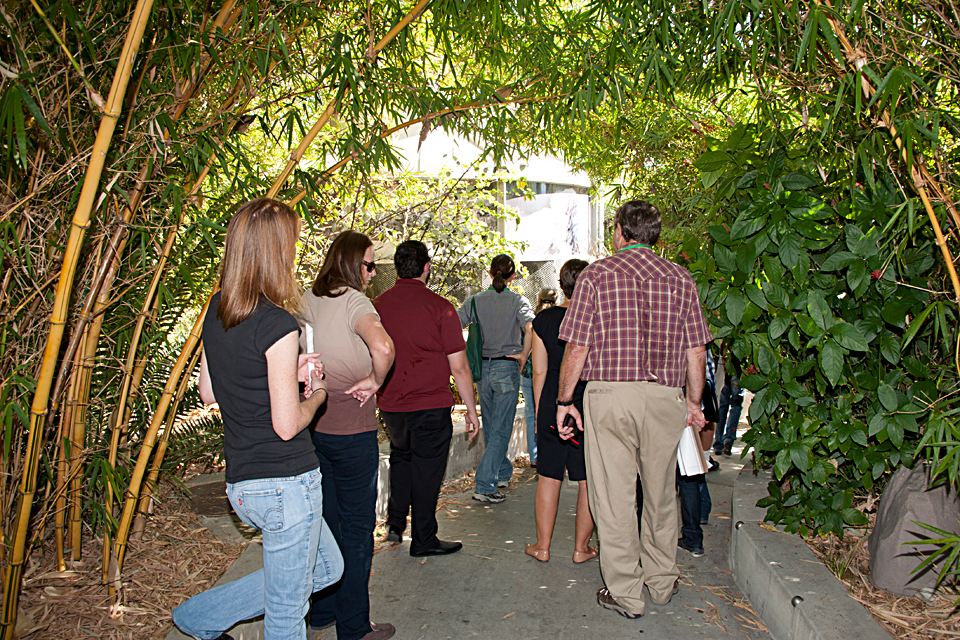CSUN Institute for Sustainability Kicks Off Tour of “Green” Hotspots

Visitors from the Association for the Advancement of Sustainability in Higher Education conference tour CSUN’s Rainforest on Wednesday, Oct. 17.
From the outer southeast corner of California State University, Northridge at the Valley Performing Arts Center to the inner core of the campus’ Arbor Grill eatery to the food garden in the northeast, visitors can see the university’s dedication to sustainability.
The 166,000-square-foot VPAC is U.S. Green Building Council Leadership in Energy and Environmental Design (LEED) gold certified as one of the few performing arts centers in the United States accredited at such a high level for its reduced carbon footprint. The large mature trees on the grounds and drought tolerant landscaping provide natural shading and reduce water consumption. The building exceeds state energy efficiency requirements through the use of a reflective “cool” roof surface, which deflects heat and saves on cooling costs and through a high volume, low velocity displacement ventilation system, just a few of its many sustainable features.
The Arbor Grill incorporates many energy efficient features, including a cooking hood with a variable speed drive and a shady outdoor dining area with misters that provide evaporative cooling in the summer, both of which save on costs and energy use. The Food Garden is used to educate students about organic and community gardening, nutritious food and healthy eating.
These are just three of the 20 stops featured as part of the Institute for Sustainability’s recently launched CSUN Sustainability Tour. The institute kicked off the tour Wednesday, Oct. 17, as part of the Association for the Advancement of Sustainability in Higher Education conference. AASHE is the first professional association of higher education institutions to promote and develop campus sustainability communities. More than a dozen students, academics and others from throughout the United States made a stop at CSUN, which has gained recognition as one of the most sustainable universities in the CSU system.
“This (the tour) is a chance to educate the community and the outside world about the things that are going on at CSUN, and it’s also a forum for an exchange of ideas, which is really useful,” said Helen Cox, director of the Institute for Sustainability.
She said AASHE’s visit to CSUN was significant in bringing national attention to the work the university is doing in this area.
CSUN was one of the sponsors of the three-day conference based at the Los Angeles Convention Center. The AASHE event is the largest North American conference focused on sustainability in higher education.
The tour also includes stops at:
- Student Recreation Center: The 138,000-square-foot fitness center, which was officially opened this year, is pending LEED gold certification for being an eco-friendly environment. Some of its green features include elliptical machines that convert kinetic energy from a workout into electricity; solar panels that generate 86.4 kilowatts of power; water-efficient landscaping; waterless urinals; and recycled materials throughout the facility.
- Chaparral Hall: CSUN’s 90,000-square-foot “biotechnology” building conserves energy throughout its spaces, from the use of fluorescent lighting to the installation of low-flush toilets and waterless urinals.
- Fuel Cell: CSUN is the first institution in the world to have a grid connected fuel cell plant. The one-megawatt advanced hydrogen fuel cell plant eliminates more than 6,400 tons of carbon dioxide a year that otherwise would be released into the atmosphere.
- Rainforest: CSUN is the only educational facility in the world to have an outdoor subtropical rainforest fully sustained from conventional industrial waste byproducts including excess water and carbon dioxide from the fuel cell.
Visitors can make an appointment for a group tour with the Institute for Sustainability; however, a “self-guided tour” is available. The tour map is available on the institute’s website. www.csun.edu/sustainability
For more information, contact the Institute for Sustainability at (818) 677-7710.


 experience
experience